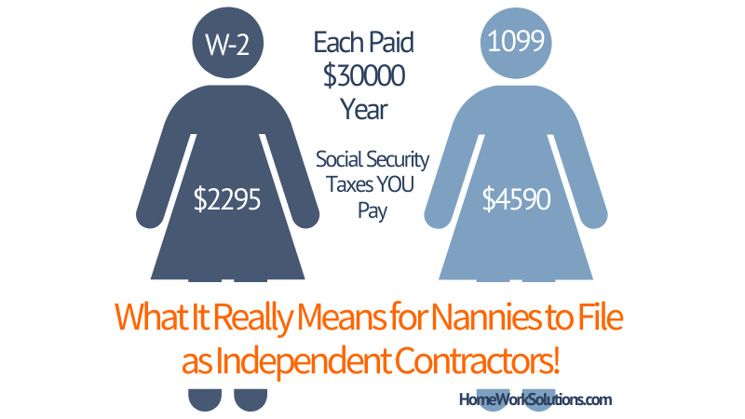
If you are working as a nanny and you have agreed to be paid as an independent contractor, it is important for you to know how to pay your taxes properly. Here are some important must-knows about filing taxes for independent contractors.
Do be aware, however, going into this that 1) you will be responsible for tax payments that legally are your employer's responsibility and 2) you will be ineligible for unemployment benefits when the job ends. These are two compelling reasons to insist on legal pay.
#1: Know what forms are required.
When income tax season rolls around, your employer is required to send you a Form 1099-MISC that reports all of the income they paid you during the last calendar year. This form is in place of a W-2. If you earn less than $600, your employer does not need to provide any documentation.
#2: Know what you’re required to pay.
If you are being paid as independent contractor, you are considered self-employed. That means the IRS requires you to adhere to a different set of filing rules and tax payments than regular employees at a company would. You will need to file a yearly 1040 tax return and pay federal income tax. In addition, you will file a Schedule C form, which will calculate your net income or loss for your 'business'. Because you are considered self-employed, you will need to pay self-employment tax, which covers your Medicare and Social Security taxes for the year. Nannies who are properly paid as employees do not pay the additional self-employment tax - this is properly paid by their employers.
#3: Know when to pay.
Self employed independent contractors that are expected to owe more than $1,000 in taxes during annual tax filing time will need to make estimated quarterly tax payments. These payments will help you cover your self-employment tax and income tax liability throughout the year. These quarterly payments are due in April, June, September, and then January of the following year. If you don’t pay these, you could get a fine or penalty.
#4: Nannies are NOT independent contractors.
The temptation of families to push tax filing responsibilities onto their nanny or other household employee is real. After all, families engage these individuals to simplify their life! However, legally nannies, other personal caregiver and most household workers are employees under the eyes of the law - no matter how you might refer to them in a contract!
The fall out of the COVID-19 pandemic caused many nannies who agreed to this arrangement to change their mind in desperation to qualify for unemployment benefits. The payroll taxes are the employer's responsibility ultimately, and many families ended up with substantial unexpected back tax bills.
Have you recently been hired as a nanny and you’re trying to figure out where to begin when it comes to filing your taxes?
We understand that there is a lot to learn, especially if you’ve never been paid as an independent contractor today. Let our tax specialists at HomeWork Solutions help! We will answer your questions and help get your taxes in order so you don’t have to worry. Contact us today to get started.
More Resources:
IRS Topic No. 554 Self-Employment Tax
